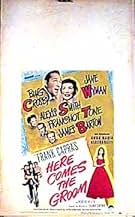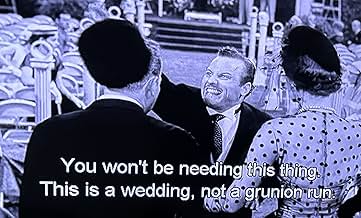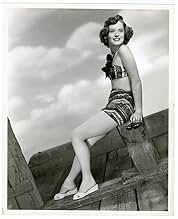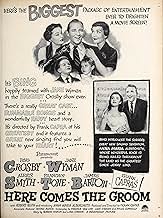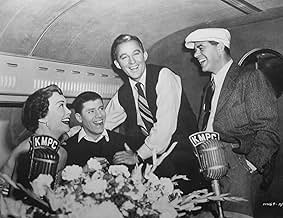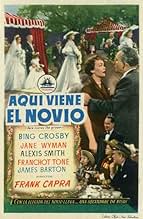NOTE IMDb
6,3/10
1,3 k
MA NOTE
Ajouter une intrigue dans votre langueForeign correspondent Pete Garvey has 5 days to win back his former fiancée, or he'll lose the orphans he adopted.Foreign correspondent Pete Garvey has 5 days to win back his former fiancée, or he'll lose the orphans he adopted.Foreign correspondent Pete Garvey has 5 days to win back his former fiancée, or he'll lose the orphans he adopted.
- Réalisation
- Scénario
- Casting principal
- Récompensé par 1 Oscar
- 3 victoires et 5 nominations au total
Jacques Gencel
- Bobby
- (as Jacky Gencel)
Avis à la une
A new and improved Jane Wyman appears in this picture with Bing Crosby. She is no longer the violated waif we saw in Johnny Belinda, but a self-confident woman who knows how to sing and clown around. Check out the moment where she visits Mr. Crosby in the guest house and proceeds to fall flat on her face in that larger-than-life dress! And she's sweet in the scenes with the kids, too.
But in case we forget that she's also a serious dramatic actress, there are moments of toughness between her and costar Alexis Smith. The film is a treat for any Wyman fan who enjoys watching the actress prove her versatility time and again, not that she ever had to. We have known about her talent for quite some time now.
But in case we forget that she's also a serious dramatic actress, there are moments of toughness between her and costar Alexis Smith. The film is a treat for any Wyman fan who enjoys watching the actress prove her versatility time and again, not that she ever had to. We have known about her talent for quite some time now.
It's a lightweight comedy, but this film has unforgettable moments. Plotwise, it's postwar Capra claptrap complete with French orphans-- but also some dazzling camera work and a few did-I-just-see-that? Surrealistic touches.
The first is a hologram of sorts: Bing's in France listening to an audio letter from fiancée, Jane Wyman-- a Dear John recordio-gram. As it's playing, Wyman materializes on the spinning record, Princess Leia-like. So I should have been prepared for anything, but when Der Bingle is on the plane back to America, he (of course) starts singing to the orphans. The tune is "Misto Cristofo Columbo"-- and suddenly Louis Armstrong walks into the airline cabin, complete with trumpet and hankie-- then up pops the bottom of the Hollywood barrel: Dorothy Lamour, Frank Fontaine and Phil Harris, all singing.
When the plane, and the plot, land in Boston, Bing has to win Jane back from Franchot Tone, which he does via a Pygmalion subplot involving Alexis Smith and men's pajamas. Hubba hubba. Best of all though is one of film's great tracking shots (nothing compared to "I Am Cuba," but still), a song-and-dance number through an office building to "In the cool cool cool of the evening." If only they'd brought Satchmo back for the big double-wedding ending.
The first is a hologram of sorts: Bing's in France listening to an audio letter from fiancée, Jane Wyman-- a Dear John recordio-gram. As it's playing, Wyman materializes on the spinning record, Princess Leia-like. So I should have been prepared for anything, but when Der Bingle is on the plane back to America, he (of course) starts singing to the orphans. The tune is "Misto Cristofo Columbo"-- and suddenly Louis Armstrong walks into the airline cabin, complete with trumpet and hankie-- then up pops the bottom of the Hollywood barrel: Dorothy Lamour, Frank Fontaine and Phil Harris, all singing.
When the plane, and the plot, land in Boston, Bing has to win Jane back from Franchot Tone, which he does via a Pygmalion subplot involving Alexis Smith and men's pajamas. Hubba hubba. Best of all though is one of film's great tracking shots (nothing compared to "I Am Cuba," but still), a song-and-dance number through an office building to "In the cool cool cool of the evening." If only they'd brought Satchmo back for the big double-wedding ending.
Another Bing Crosby vehicle and another job for Frank Capra at Paramount, his last, Here Comes the Groom is a light and frilly affair that takes too long to do too little but is intermittently charming along the way. It's a largely unremarkable film that doesn't try to make a whole lot of sense, especially in its ending, but at least Crosby and Jane Wyman work well together.
Pete Garvey (Crosby) is a war correspondent still in Paris several years after the end of WWII, latching onto an orphanage of war orphans about whom he is writing a series of stories about in order to get them adopted and sending them back to his editor George (Robert Keith) who is getting tired of them since the world has moved on. He also has a girl back home, Emmadel (Wyman), who has grown sick of waiting for her beau to return and sends him a record of her voice telling him that she's leaving him. It's really the only fun bit of filmmaking in the whole thing since Capra has her superimposed on top of the record to speak the lines and even ends with a fun bit of nonsense around the mechanics of the player itself.
Well, Pete gets the bug to go back home, but not before he disappears for two months to find the birth certificates of his two favorite orphans Bobby (Jacques Gencel) and Suzi (Beverly Washburn). I think this is supposed to establish Pete as forgetful but dedicated, and yet the rest of the film is him laser focused on getting what he needs without wavering. It's almost like the script by Virginia Van Upp, Liem O'Brien, and Myles Connolly was kind of just slap-dashed together, or something.
Anyway, the only real reason to see this film is Crosby himself. He's a charming lead and much more in line with the tenor of the overall picture here than he had been in Riding High. Here, he's a lovable heel who needs to find a way to get back home, convince the woman he loves that she still loves him, and undermine her quickly scheduled marriage to Wilbur Stanley (Franchot Tone), the latest in the line of a wealthy and powerful Bostonian family. The competition that develops between Pete and Wilbur is friendly and leads to no real hard feelings on any front, even when Wilbur conspires to have the orphans adopted if and when Pete doesn't get married on time (a condition of the adoption since he's a bachelor). It's almost like none of the characters consider there to be anything like stakes around the place.
Well, the bulk of the film is Crosby charming his way back into Emmadel's heart (the first rendition of the Oscar winning song "In the Cool, Cool, Cool of the Evening" is a delightful narrative treat since it shows the two still having a connection that develops over the song), spruce up Wilbur's cousin (fourth-cousin once removed) Winifred (Alexis Smith) so that she can become attractive to Wilbur instead, all while George hangs around for little reason other than to give some funny quips now and then. The finale is the big, to do wedding with many important guests and some bit of farce to get Pete on the altar instead of Wilbur that everyone just accepts because the feelings of the orphans are important and this very real ceremony isn't real, or something. It makes just this side of no sense, made all the weirder by Wilbur's reaction to it all which is like he didn't care.
So, it's very slight. It has some real charm to it. It's loosely told and kind of nonsensical. It has a nice song that it overplays (I didn't need to hear "Evening" three times, but whatever, it's not like there's a whole lot else). It's primarily a vehicle to showcase Bing Crosby's charm, and it does that reasonably well.
I think it would have worked better at 90 minutes instead of 110, though.
Pete Garvey (Crosby) is a war correspondent still in Paris several years after the end of WWII, latching onto an orphanage of war orphans about whom he is writing a series of stories about in order to get them adopted and sending them back to his editor George (Robert Keith) who is getting tired of them since the world has moved on. He also has a girl back home, Emmadel (Wyman), who has grown sick of waiting for her beau to return and sends him a record of her voice telling him that she's leaving him. It's really the only fun bit of filmmaking in the whole thing since Capra has her superimposed on top of the record to speak the lines and even ends with a fun bit of nonsense around the mechanics of the player itself.
Well, Pete gets the bug to go back home, but not before he disappears for two months to find the birth certificates of his two favorite orphans Bobby (Jacques Gencel) and Suzi (Beverly Washburn). I think this is supposed to establish Pete as forgetful but dedicated, and yet the rest of the film is him laser focused on getting what he needs without wavering. It's almost like the script by Virginia Van Upp, Liem O'Brien, and Myles Connolly was kind of just slap-dashed together, or something.
Anyway, the only real reason to see this film is Crosby himself. He's a charming lead and much more in line with the tenor of the overall picture here than he had been in Riding High. Here, he's a lovable heel who needs to find a way to get back home, convince the woman he loves that she still loves him, and undermine her quickly scheduled marriage to Wilbur Stanley (Franchot Tone), the latest in the line of a wealthy and powerful Bostonian family. The competition that develops between Pete and Wilbur is friendly and leads to no real hard feelings on any front, even when Wilbur conspires to have the orphans adopted if and when Pete doesn't get married on time (a condition of the adoption since he's a bachelor). It's almost like none of the characters consider there to be anything like stakes around the place.
Well, the bulk of the film is Crosby charming his way back into Emmadel's heart (the first rendition of the Oscar winning song "In the Cool, Cool, Cool of the Evening" is a delightful narrative treat since it shows the two still having a connection that develops over the song), spruce up Wilbur's cousin (fourth-cousin once removed) Winifred (Alexis Smith) so that she can become attractive to Wilbur instead, all while George hangs around for little reason other than to give some funny quips now and then. The finale is the big, to do wedding with many important guests and some bit of farce to get Pete on the altar instead of Wilbur that everyone just accepts because the feelings of the orphans are important and this very real ceremony isn't real, or something. It makes just this side of no sense, made all the weirder by Wilbur's reaction to it all which is like he didn't care.
So, it's very slight. It has some real charm to it. It's loosely told and kind of nonsensical. It has a nice song that it overplays (I didn't need to hear "Evening" three times, but whatever, it's not like there's a whole lot else). It's primarily a vehicle to showcase Bing Crosby's charm, and it does that reasonably well.
I think it would have worked better at 90 minutes instead of 110, though.
This film is never considered one of Frank Capra's best, but that shouldn't keep potentially interested viewers from seeing it. On its face, it doesn't seem to be what has come to be known as a Capra film because it isn't issue-laden and doesn't really make a point other than the "follow your heart" admonition that most romantic comedies invoke. In many ways, it's a remake of Capra's "It Happened One Night" (1934), and while it doesn't have the financially and emotionally gut-wrenching backdrop of the Depression to give it the weight of the original, it's nonetheless pleasant and clever.
To appreciate "Here Comes the Groom" is to embrace a bunch of disparate parts. First and foremost, this is a Bing Crosby film, replete with seemingly ad-libbed asides that filled the Hope/Crosby "Road" pictures. Bing, who plays a newspaper reporter (one of Capra's favorite devices) but basically plays himself, has as his foil not just one but three adult characters (his editor, his would-be father-in-law and his romantic competitor), plus a passel of kids, in particular a French boy and girl whom he has virtually adopted as his own. The two kids are cute and genuinely good-natured, so when they are on screen, as they often are, they light up the place. Their repeated mimicry of the Crosby character's signature farewell gesture -- a tooth-filled smile and open-fingered hand wave -- never fails to please (except for the final time, in the film's closing seconds, in which it appears that the duo is starting to run out of steam).
Jane Wyman is a strong presence in the film as well, and quite appealing as someone torn between an elusive true love and the biological clock. She is every bit the musical equal of Crosby in their imaginatively choreographed presentation of the movie's theme song "In the Cool, Cool, Cool of the Evening," staged in various parts of a huge office, then down a half-dozen floors in an elevator and out to the street.
Franchot Tone is the other big name among the actors, and he plays his role as Wyman's rich fiance with characteristic aplomb. Nothing seems to rattle Tone's character, even the possibility of losing Wyman, which may be part of the film's "follow your heart" message.
Easily outshining Tone is Alexis Smith, who never received the career-making, starring roles that she deserved. She plays a caterpillar whom Crosby, in his own strategic interest, turns into a butterfly, and while Crosby's tutelage is over-the-top sexist by today's standards, her transformation and resulting passion are eye-popping, for the Tone character and his staid relatives as well as for the viewer.
With such stong characterizations and actors, Capra for some reason decided he needed something more, so he threw in a grab bag of other elements. Before Crosby and his two adoptees fly back to the States, there's an extended operatic solo by the quite young and show-stopping Anna Maria Alberghetti. And when Crosby and the youthful pair finally get on the plane, they happen to sitting next to a group of USO entertainers, so of course there's a song, "Cristofo Columbo," which brings in fleeting contributions by Louis Armstrong, Frank Fontaine, Dorothy Lamour and Phil Harris. These are tangents, to be sure, and they make the viewer wonder momentarily if Capra has lost his narrative thread, but they don't last long and are engaging in their own right. (Perhaps the "Cristofo Columbo" scene is supposed to echo the "Man on the Flying Trapeze" scene from "It Happened One Night.")
Those looking for further Capra touches will be warmed by the brief appearances of H.B. Warner (the judge in "Mr. Deeds," a senator in "Mr. Smith" and Mr. Gower in "It's a Wonderful Life"), Charles Lane (Potter's real-estate man in "Wonderful Life") and Charles Halton (bank examiner in "Wonderful Life"). The cinematography in this film is serviceable, but there are frustrating instances of sloppiness. At one point, in a reaction shot, the camera mysteriously lingers on Crosby's editor as he does nothing for about five seconds. It's an inconsequential flub, but it feels long enough to make the viewer wonder if the film's cutter and Capra himself just went to sleep. (It's reminiscent of a similar and even longer gaffe in Capra's "You Can't Take It with You" from 1938.)
A more egregious example of visual inattention comes during a physical argument between the Wyman and Smith characters. For the actual fight, in which the two flip each other over with quick arm twists, it's all too obvious that stunt doubles are used. The doubles' faces, which look nothing like those of the two actresses (they may even be men), are repeatedly shown, and the hair color and length of the Smith double doesn't come close to matching the hair of Smith. Who was minding the store when this was shot? It's the kind of mistake that makes all kinds of viewers, not just movie buffs, roll their eyes.
To its credit, the film does lay out, in albeit cliche form, the reality of class differences. But both rich and not-so-rich are given gentle appreciative treatment. Clearly, the viewer is supposed to side with the more down-to-earth characters of Crosby and Wyman, but the rich are not cardboard villains, either. It's almost as if the message is that there is a time and place (and hope) for people from all walks of life.
"Here Comes the Groom" (a clever title in itself) is a product of the pop culture of its time; it's all-white (save for Armstrong), and traditional gender roles hold sway. But look beyond that and you will find a film that you probably didn't know you would like so well. Crosby, as top comic banana, plays his likeable persona perhaps better than ever, and the film leaves lots of smiles in its wake. The ending may be predictable, but this is a movie in which it's just fun to see the character-based twists and turns that steer the plot to its conclusion.
To appreciate "Here Comes the Groom" is to embrace a bunch of disparate parts. First and foremost, this is a Bing Crosby film, replete with seemingly ad-libbed asides that filled the Hope/Crosby "Road" pictures. Bing, who plays a newspaper reporter (one of Capra's favorite devices) but basically plays himself, has as his foil not just one but three adult characters (his editor, his would-be father-in-law and his romantic competitor), plus a passel of kids, in particular a French boy and girl whom he has virtually adopted as his own. The two kids are cute and genuinely good-natured, so when they are on screen, as they often are, they light up the place. Their repeated mimicry of the Crosby character's signature farewell gesture -- a tooth-filled smile and open-fingered hand wave -- never fails to please (except for the final time, in the film's closing seconds, in which it appears that the duo is starting to run out of steam).
Jane Wyman is a strong presence in the film as well, and quite appealing as someone torn between an elusive true love and the biological clock. She is every bit the musical equal of Crosby in their imaginatively choreographed presentation of the movie's theme song "In the Cool, Cool, Cool of the Evening," staged in various parts of a huge office, then down a half-dozen floors in an elevator and out to the street.
Franchot Tone is the other big name among the actors, and he plays his role as Wyman's rich fiance with characteristic aplomb. Nothing seems to rattle Tone's character, even the possibility of losing Wyman, which may be part of the film's "follow your heart" message.
Easily outshining Tone is Alexis Smith, who never received the career-making, starring roles that she deserved. She plays a caterpillar whom Crosby, in his own strategic interest, turns into a butterfly, and while Crosby's tutelage is over-the-top sexist by today's standards, her transformation and resulting passion are eye-popping, for the Tone character and his staid relatives as well as for the viewer.
With such stong characterizations and actors, Capra for some reason decided he needed something more, so he threw in a grab bag of other elements. Before Crosby and his two adoptees fly back to the States, there's an extended operatic solo by the quite young and show-stopping Anna Maria Alberghetti. And when Crosby and the youthful pair finally get on the plane, they happen to sitting next to a group of USO entertainers, so of course there's a song, "Cristofo Columbo," which brings in fleeting contributions by Louis Armstrong, Frank Fontaine, Dorothy Lamour and Phil Harris. These are tangents, to be sure, and they make the viewer wonder momentarily if Capra has lost his narrative thread, but they don't last long and are engaging in their own right. (Perhaps the "Cristofo Columbo" scene is supposed to echo the "Man on the Flying Trapeze" scene from "It Happened One Night.")
Those looking for further Capra touches will be warmed by the brief appearances of H.B. Warner (the judge in "Mr. Deeds," a senator in "Mr. Smith" and Mr. Gower in "It's a Wonderful Life"), Charles Lane (Potter's real-estate man in "Wonderful Life") and Charles Halton (bank examiner in "Wonderful Life"). The cinematography in this film is serviceable, but there are frustrating instances of sloppiness. At one point, in a reaction shot, the camera mysteriously lingers on Crosby's editor as he does nothing for about five seconds. It's an inconsequential flub, but it feels long enough to make the viewer wonder if the film's cutter and Capra himself just went to sleep. (It's reminiscent of a similar and even longer gaffe in Capra's "You Can't Take It with You" from 1938.)
A more egregious example of visual inattention comes during a physical argument between the Wyman and Smith characters. For the actual fight, in which the two flip each other over with quick arm twists, it's all too obvious that stunt doubles are used. The doubles' faces, which look nothing like those of the two actresses (they may even be men), are repeatedly shown, and the hair color and length of the Smith double doesn't come close to matching the hair of Smith. Who was minding the store when this was shot? It's the kind of mistake that makes all kinds of viewers, not just movie buffs, roll their eyes.
To its credit, the film does lay out, in albeit cliche form, the reality of class differences. But both rich and not-so-rich are given gentle appreciative treatment. Clearly, the viewer is supposed to side with the more down-to-earth characters of Crosby and Wyman, but the rich are not cardboard villains, either. It's almost as if the message is that there is a time and place (and hope) for people from all walks of life.
"Here Comes the Groom" (a clever title in itself) is a product of the pop culture of its time; it's all-white (save for Armstrong), and traditional gender roles hold sway. But look beyond that and you will find a film that you probably didn't know you would like so well. Crosby, as top comic banana, plays his likeable persona perhaps better than ever, and the film leaves lots of smiles in its wake. The ending may be predictable, but this is a movie in which it's just fun to see the character-based twists and turns that steer the plot to its conclusion.
When the best thing about a BING CROSBY/JANE WYMAN film is a song called "In the Cool, Cool, Cool of the Evening", you know you're in trouble. What is supposed to be harmless fluff is pretty empty fluff at that. And why anyone is surprised that Jane Wyman can carry a tune with the best of them, mystifies me. Miss Wyman made her debut playing dizzy chorus girls who usually tossed off a song and dance number before the first reel was over, in a number of films, mainly at Warner Bros. And later on, after she became a big star, she still contributed nicely to the Cole Porter bio, NIGHT AND DAY.
Anyway, here she has one of her brisk, no nonsense roles as a gal who's tired of waiting around for her globe trotting boyfriend (Crosby) to take her down the aisle, so she's engaged to FRANCHOT TONE. But Crosby manages to use all of his wiles to coax her back, even if it includes some shenanigans involving ALEXIS SMITH (of all people), who gives one of her best comedic roles all the spirit it deserves.
But when all is said and done, HERE COMES THE GROOM seems sub-standard and a bit foolish, unworthy of talents like Crosby and Wyman. Their best moment comes when they croon the title tune while choreographed waltzing around a huge office, but it's not enough to keep the rest of the story from floundering amid too many missed opportunities.
Summing up: Capra running on empty can be tiresome.
Anyway, here she has one of her brisk, no nonsense roles as a gal who's tired of waiting around for her globe trotting boyfriend (Crosby) to take her down the aisle, so she's engaged to FRANCHOT TONE. But Crosby manages to use all of his wiles to coax her back, even if it includes some shenanigans involving ALEXIS SMITH (of all people), who gives one of her best comedic roles all the spirit it deserves.
But when all is said and done, HERE COMES THE GROOM seems sub-standard and a bit foolish, unworthy of talents like Crosby and Wyman. Their best moment comes when they croon the title tune while choreographed waltzing around a huge office, but it's not enough to keep the rest of the story from floundering amid too many missed opportunities.
Summing up: Capra running on empty can be tiresome.
Le saviez-vous
- Anecdotes"In the Cool, Cool, Cool of the Evening" was the fourth song performed by Bing Crosby in a film that went on to win the Academy Award for Best Song.
- GaffesWhen Winifred seeks shelter in Garvey's home, George is on the phone. In a close-up, the phone is to his ear, but in the next medium shot, the phone is hung up, and he picks up the receiver again.
- Citations
Husband on Airplane: [Complaining about fellow passenger Bing Crosby's singing on plane] Oh... There they go again ! Don't these actors ever stop making noises?
Wife on Airplane: They're USO people. They sing for soldiers.
Husband on Airplane: Soldiers can shoot back. They've got guns.
- ConnexionsFeatured in Paramount Presents (1974)
- Bandes originalesMisto Cristofo Columbo
Written by Ray Evans and Jay Livingston
Performed by Bing Crosby, Dorothy Lamour, Louis Armstrong, Cass Daley,
Phil Harris, Frank Fontaine
Meilleurs choix
Connectez-vous pour évaluer et suivre la liste de favoris afin de recevoir des recommandations personnalisées
- How long is Here Comes the Groom?Alimenté par Alexa
Détails
- Date de sortie
- Pays d’origine
- Langues
- Aussi connu sous le nom de
- Here Comes the Groom
- Lieux de tournage
- Société de production
- Voir plus de crédits d'entreprise sur IMDbPro
Box-office
- Budget
- 2 117 000 $US (estimé)
- Durée1 heure 53 minutes
- Couleur
- Rapport de forme
- 1.37 : 1
Contribuer à cette page
Suggérer une modification ou ajouter du contenu manquant

Lacune principale
By what name was Si l'on mariait papa (1951) officially released in India in English?
Répondre

